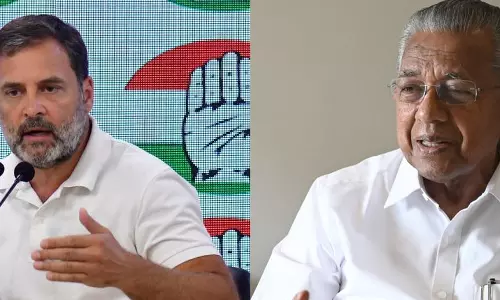
The Wake-up Call from WHO
text_fieldsThe report of World Health Organization (WHO), after the extensive study conducted in 2016, and its analysis, about atmosphere pollution in 108 countries including 4300 cities, was published last week.
It emerged that 90 per cent of world's population are breathing polluted air. Most cities of the world, regardless of developed, developing or poor countries, are adding to polluted air. Among them, the situation in Africa and West Asia is all the more scaring. Out of 47 African countries, only seven enjoy clean air. The most polluted air prevail in India and China. Of the 20 cities with the worst polluted air, 14 are in our country, and in them the level of atmosphere pollution is 17 times that of the safe limits specified by WHO. The number of people who die every year because of polluted air worldwide is 7 million, the majority of them being from south Asia. According to a Lancet Commission study pollution-caused deaths in India number 2.5 million a year. And 26 million people contract diseases annually as a result of breathing polluted air.
In the case of India, pollution is not a matter limited to the 14 cities mentioned in the report. It is a malady affecting all small and big cities and even villages which form the majority. Data do not come to light about the situation prevailing there, which are grimmer and more terrifying than indicated in the WHO report, only because our data collection machinery about pollution levels is really pathetic. As per the report submitted to the Central Government by the National Clean Air Programme, we have not set up any mechanism to know about air pollution in even a generic manner. Delhi is the only area in the country which has set up a machinery to scientifically record and analyse atmosphere pollution. So much for the apathy in trying to solve air pollution of a country which gets much blame for carbon emissions and where most people turn sick or die because of pollution.
It was about two years ago that in a similar study conducted by WHO, the same warning was given to India. If the number of endangered cities then was 10, it has now grown to 14. We are in the red flag area of the deadline for seeking and implementing different ways to prevent air pollution. Right from large-scale industrial units that freely emit chemical substances like sulphur dioxide, nitrogen oxides and carbons which pollute the atmosphere, down to the neighbourhoods that burn plastic at the border of their compound, are equally to blame for this situation. Proliferation of vehicles and the petroleum waste produced by them, affects foetal growth and cause low birth weight of newborns and unhealthy babies, as shown after in a study of 600,000 newborn babies and mothers, conducted by three leading educational institutions of London. Deforestation and the desertification of earth are the major causes of polluted atmosphere. Suffice is to say that unless man's avaricious obsession with development is checked, our dirty water and unclean air will never become clean.
For effective prevention of countless diseases from encephalitis to asthma, we need to recapture that precious thing called clean air. The first thing to do for that is to be ready to recognize and face the sad fact that the country and its people are breathing dirty air. There are several small and big practical ways to resist and mitigate air pollution. The governments and citizens will have to brace themselves in all earnestness to implement and make them a success. It will also entail proving the mettle in reining in firms with greater carbon footprint through stringent regulations. If that happens, within five years atmosphere pollution can be reduced to 50 per cent, as envisaged in the national plan. Or else, if we dismiss the wake-up call, the fate of the majority will be to continue inhaling unclean air, blaming time and destiny and leading a tragic diseased life.























